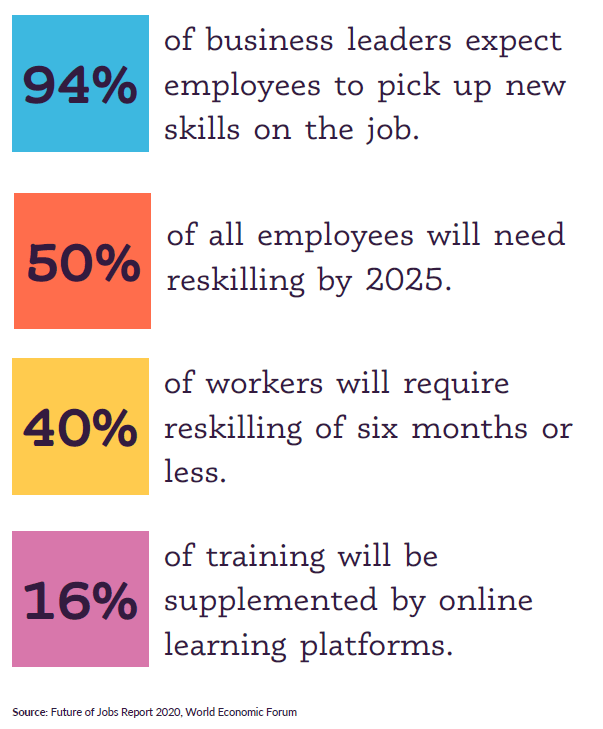The World Economic Forum (WEF) reported in 2020 that “40% of current workers’ core skills are expected to change in next 5 years”, accompanied by a list of key skills that are needed in the workplace by 2025. The WEF provides guidance to educators but where the WEF is perhaps less clear is what exactly employers can do to solve the reskilling problem.
Conversations that I have had with CEOs, Directors of Learning & Development and Organizational Development are all in agreement about what needs to be done but have very mixed outlooks on the solutions. There are lots of products on offer, lots of service providers, and the modern requirement to tailor the curation of programs for an individualized experience adds another level of complexity.

Top 10 job skills for 2025
- Analytical thinking and innovation
- Complex problem-solving
- Active learning and learning strategies
- Critical thinking and analysis
- Creativity, originality and initiative
- Leadership and social influence
- Technology use, monitoring and control
- Technology design and programming
- Resilience, stress tolerance and flexibility
- Reasoning, problem solving and ideation
It is interesting that the use of online was still only predicted to be 16% in 2020 which seems pretty low until you consider Universities and schools are generally quite slow to move. As a whole, the focus remains almost exclusively on the development of the individual rather than the organizational need to increase the performance of all. And that’s a problem.
If we only focus on individual development and not the group then not much is going to change, particularly in relation to the WEF skills.
Tim Dew
It has been proven that bringing groups together solves complexity faster and increases the cognitive load that can be handled at any one time. Running organizations is not easy. It shouldn’t be forgotten that the reason why we employ many and get them to work together is to address this very need.
Group learning works. It encourages empathetic and comparative understanding for individuals and the ability to accelerate the iteration of solutions.
The key here is that we need to equip everyone to work together as well as develop their own skills and mastery.
With the benefit of the significant amount of science available on the subject, I feel strongly that care should be taken by employers to adopt a hybrid model; a concurrent approach to the development of individual skills and the group.
The brain is the most phenomenal instrument at our disposal and more can be done when they work together.
Tim Dew
What are business simulations?
Business simulations is a broad category that encompasses the application of game technologies in the workplace. Disambiguating the different types for the newcomer is difficult.
Words like games, serious games, gamification, behavioural dynamics and simulations are used by suppliers frequently to describe their products. Some are fully immersive environments that have been built with cutting-edge technologies, some with the latest and coolest gadgetry, some with the development of the players in mind, and some not. Many people call what we do gamification. In my opinion it isn’t, but I know what they mean so that’s ok!
In many cases, people accessing this market will have in their mind the thing they did at university many years ago, but technology and evidence have moved on a lot. Others may imagine Call of Duty and role-playing games. There are simulation games like this but, so far, they have tended to be focused more on the capabilities of the technology rather than the outcome.
In my opinion, providers of simulations should not present them as an all-encompassing panacea to solve problems. They can be very powerful tools, but buyers should view them as part of a rich solution to augment your plans rather than replace them.
Why use simulation training?
In the knowledge that not all simulations are equal, the good ones can provide your teams with profound learning and often life-transforming experiences. For instance, we build our simulations on one proven psychological ethos: “The only way to truly believe in an idea is to believe it was your own idea in the first place”.
They can massively accelerate learning, encourage effective teamwork and whole-of-system thinking, increase awareness of many complex organizational challenges, improve empathy, generate context, and be fun at the same time.
The nature of good simulations is that they are experiential. Just like when you learnt to ride a bike or swim, the learning lasts forever. How well do you remember your last slide deck training?
People describe our games as entering a vortex. Time flies and the experience is profound. This is not about ‘beating the game’. This is not a board game nor a virtual reality experience; this is about how you unleash the brainpower that is dormant in your organization. It’s time to awaken the lion within.
My advice: try some games out. The good ones will blow your hair back. Allow them to do so.
Find out how our simulations can upskill your workforce here.

